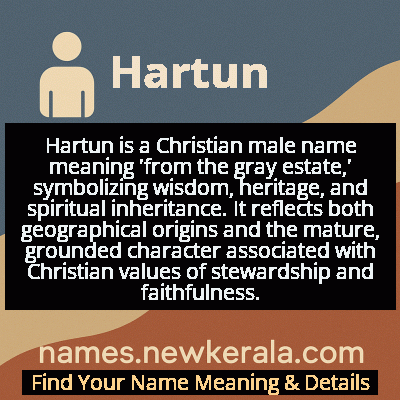Hartun Name Meaning & Details
Origin, Popularity, Numerology Analysis & Name Meaning of Hartun
Discover the origin, meaning, and cultural significance of the name HARTUN. Delve into its historical roots and explore the lasting impact it has had on communities and traditions.
Name
Hartun
Gender
Male
Origin
Christian
Lucky Number
1
Meaning of the Name - Hartun
Hartun is a Christian male name meaning 'from the gray estate,' symbolizing wisdom, heritage, and spiritual inheritance. It reflects both geographical origins and the mature, grounded character associated with Christian values of stewardship and faithfulness.
Hartun - Complete Numerology Analysis
Your Numerology Number
Based on Pythagorean Numerology System
Ruling Planet
Sun
Positive Nature
Leaders, ambitious, highly driven, self-reliant, innovative.
Negative Traits
Overly aggressive, domineering, impatient, selfish.
Lucky Colours
Red, orange, gold.
Lucky Days
Sunday.
Lucky Stones
Ruby, garnet.
Harmony Numbers
2, 3, 9.
Best Suited Professions
Entrepreneurs, managers, engineers.
What People Like About You
Courage, determination, leadership.
Famous People Named Hartun
Hartun of Cornwall
Christian missionary
Early Celtic saint who established monastic communities in southwestern England
Hartun Al-Mansur
Theologian and scholar
Armenian Christian scholar who translated Greek theological works into Arabic
Hartun Vardapet
Religious leader and historian
Armenian cleric who documented early Christian communities in the Caucasus region
Hartun Petrosyan
Religious artist
Master illuminator of Christian manuscripts in the Armenian tradition
Name Variations & International Equivalents
Click on blue names to explore their detailed meanings. Gray names with will be available soon.
Cultural & Historical Significance
The name gained prominence during the medieval period when Armenian Christians maintained their religious identity despite various political changes in the region. Hartun became symbolic of cultural preservation and religious fidelity, often chosen for boys in families that valued both their Christian faith and Armenian heritage. The name's endurance through centuries of cultural challenges demonstrates its deep cultural resonance and the importance of naming traditions in maintaining community identity. In modern contexts, it represents a living connection to ancient Christian traditions and the resilience of Armenian culture.
Extended Personality Analysis
Individuals named Hartun are typically perceived as thoughtful, resilient, and deeply principled. They often exhibit a strong sense of tradition and family loyalty, combined with a quiet determination that helps them navigate challenges with grace and perseverance. Their 'gray estate' association suggests a personality that values stability, wisdom gained through experience, and a balanced approach to life's complexities.
Hartuns are often described as having an old soul quality, displaying maturity beyond their years and a natural inclination toward contemplation and spiritual matters. They tend to be reliable friends and community members who provide steady leadership during turbulent times. While they may appear reserved initially, those who know them well appreciate their depth of character, dry wit, and unwavering commitment to their values. Their strength lies in their ability to blend traditional wisdom with practical problem-solving, making them excellent mediators and trusted advisors in both personal and professional contexts.
Modern Usage & Popularity
In contemporary times, Hartun remains primarily used within Armenian Christian communities, both in Armenia and throughout the global diaspora. While not among the most popular names, it maintains a steady presence as a traditional choice that honors family heritage and religious identity. The name has seen a modest revival in recent years as younger generations of Armenian Christians seek to reconnect with their cultural roots. It is particularly favored by families who value historical continuity and want to pass on names that have been in their family for generations. Modern usage tends to be concentrated in communities with strong Armenian cultural institutions and churches, with occasional adoption by Christians from other traditions who appreciate its historical depth and meaningful symbolism.
Symbolic & Spiritual Meanings
The symbolic meaning of Hartun extends beyond its literal translation to represent endurance, wisdom, and spiritual grounding. The 'gray' element symbolizes the wisdom that comes with age and experience, while 'estate' represents both physical inheritance and spiritual legacy. In Christian symbolism, gray can represent the blending of divine light and human experience, suggesting someone who bridges heavenly wisdom with earthly practicality. The name carries connotations of stability and permanence, much like the ancient stone churches and monasteries of Armenia that have withstood centuries of change. It symbolizes the transmission of faith and culture from one generation to the next, embodying the idea that true wealth lies in spiritual inheritance rather than material possessions, and connecting to the Christian concept of being stewards of God's creation.

